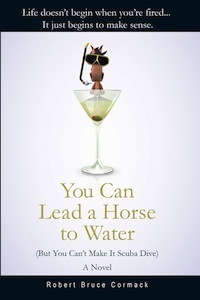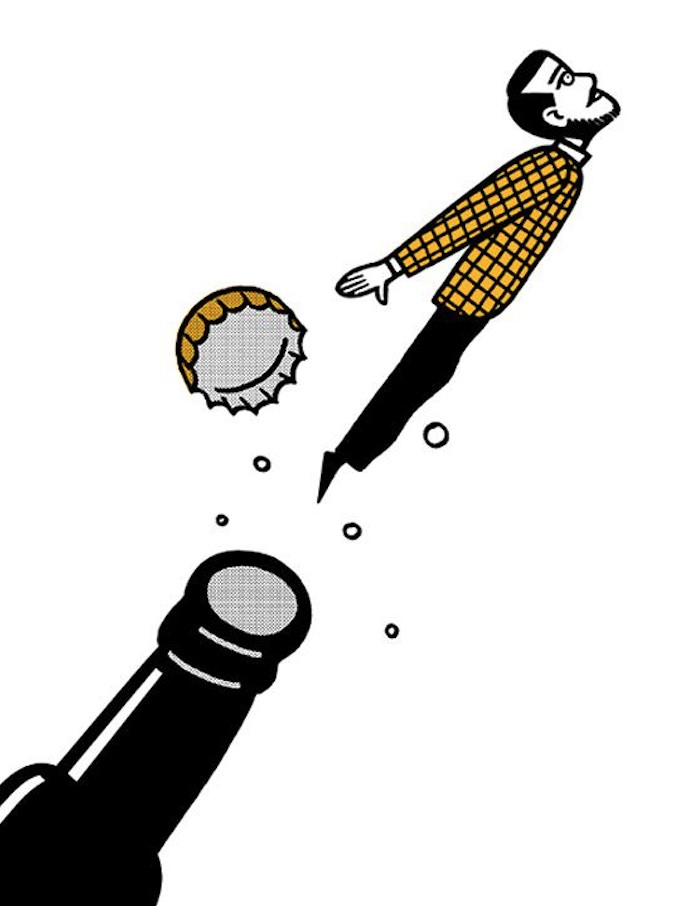Why Advertising Went Mad Dog Crazy.

“Well, they picked it like a chicken bone, and I think I’m half insane, Ma, look what they’ve done to my song.” Melanie Safka
In the 60s, Tom Wolfe wrote The Electric Kool-Aid Acid Test, what Ken Kesey and his Merry Pranksters called an initiation of sorts. Drink the Kool-Aid and see life from a different perspective — or perhaps another dimension. Some saw God, others jumped from rooftops and saw pavement.
Over the years, we took that “initiation” into safer territory. You didn’t have to “tune in, turn on and drop out.” You simply had to accept consumption as fun. You drove fun, ate fun, developed a craving for fun. It was occupational. We all worked to achieve fun and passed it along to our children.
Advertising exploited the one-dimensional medium. Hell, we were the one-dimensional medium. Herbert Marcuse, in his book One-Dimensional Man, felt the time was coming when “critical thought and oppositional behavior would wither way.” Boy, was he right. We withered down to our shoe tops. We swung and swayed, we jumped in the water, we sold happiness like a gold-braided dictator sells fealty.
“These are queasy times,” Hunter S. Thompson used to say, and nothing made it seem more prescient than what we’re witnessing today. Like Haight-Ashbury when the party ended, we didn’t see it coming. We barely noticed the mad-dog craziness turning commercials into withering dictators.
Volkswagen fell the hardest. It was despicable from every angle. The company that gave us “Have you ever wondered how the man who drives the snow plow gets to the snow plow?” found themselves pleading guilty to charges of conspiracy to commit wire fraud, violating the Clean Air Act, customs violations and obstruction of justice.
Six executives, including the head of engine development, were charged. The total cost of deception, including criminal and civil penalties, is said to be around $4 billion. It will go down as one of the costliest scandals in history, turning an automotive giant into a groveling, mange-driven hound.
Just as dogs start looking like their owners, advertisers followed Volkswagen’s descent, leaving behind everything morally right about the company. It was justice in a way. Volkswagen didn’t deserve clever or even thoughtful advertising. Where agencies like Doyle Dane Bernbach raised them up, gave them legitimacy, the new agencies brought them down to gutter level.
Their latest campaign: “That Feeling. Only Better,” shows a couple sneaking onto a racehorse at a racetrack, conveying the turbo charms of the Passat. As Advertising Age pointed out, there isn’t the usual “Do not attempt” disclaimer, “so now we want to attempt to commandeer a racehorse.”
That’s the least of the infractions with this campaign. Between showing a bear trying to open a cooler and a man finding a secret “man den” hidden in the wall during an open house, it’s the lowest form of advertising. You know it’s the lowest form when a car company shows lease rates at the end.
If you haven’t formed an opinion on the car itself, what difference do lease rates make? American car manufacturers have been blatantly oblivious to this for years. Historically, Volkswagen rose above it. They were clever, thought-provoking, always ahead of their counterparts. Now they’re just another car company with nothing to say. “It’s just fun at a good price,” one advertising executive tried to explain. “What else do people need to know?”
That’s the withering of one-dimensional advertising. We wither under the strain of a jingle and running shots. Forget that we’re thinking, logical consumers. Forget that we have a declining middle class and companies like Home Depot and Lowe’s are showing the healthiest gains.
We may have been on the road in the 60s, 70s, 80s, but now we’re grabbing hammers and saws. Fun is improving our houses, our diets, our health. If we’re interested in lease rates, it’s because our money isn’t going as far as it did. We still want our electronics, but that’s in the interest of saving, too. We choose Netflix over going to the movies, online dating sites instead of hitting the bars, and a vibrating phone can save money in so many ways.
All of which makes the fun described in commercials today so irritating. It’s an anachronism. If we’re drinking beer on a dock, it’s because we built the dock. Same goes for vacations. We’re not looking for hedonistic parties anymore. We’re looking at culture, history — even places to live.
The smart money these days is on Panama. They’re now offering a pensionado program, giving foreign seniors 50 percent off meals, airfares, prescription medicines and even closing costs.
That’s smart — not like McDonalds, Wendy’s or Burger King. They have nothing new to say. They’re just dividing up the audience. McDonald’s introduced the “frork,” a silly idea intended to showcase their new sandwich menu, then they had to apologize for their “Grief” commercial because it suggested childhood grief could be abated with a Fillet-O-Fish sandwich
Pepsi made such an error in judgment using Kendall Jenner in their mock protest commercial, that Black Lives Matter was practically made speechless by its stupidity and white bread sophistry.
We’ve withered like Herbert Marcuse predicted. We’ve lost critical thought and oppositional behavior. If advertising reflects society, then we’re falling faster than we can stop ourselves. Advertisers are too dumbstruck and doe-eyed to even know what’s tasteful anymore. They don’t care.
“It’s cheap and it’s fun,” is all they’ve got to say. There’s nothing to touch our reasoning or thought processes. Nothing like “Think Small” which kept everyone talking around the watercoolers.
We’ve reached the stage of mental submission. We discuss Kendall Jenner and the“frork.” We throw in lease rates and sets of tires. It would be nice to think we’ve got nowhere to go but up. Trouble is, nobody’s paying attention anymore. Nobody cares.
We’re all “frorked.”
Robert Cormack is a freelance copywriter, novelist and blogger. His first novel “You Can Lead a Horse to Water (But You Can’t Make It Scuba Dive)” is available online and at most major bookstores. Check out Yucca Publishing or Skyhorse Press for more details.

""
Articles from Robert Cormack
View blog
All I did was write the first Canadian rock jingle. · I still remember how we wore our jeans with le ...

Or is it us? (It's us). · “I intend to live forever, or die trying.” Groucho Marx · I didn’t want to ...

It could be worse than losing. · “We are what we pretend to be, so we must be careful what we preten ...
Related professionals
You may be interested in these jobs
-
Baker
Found in: Talent CA C2 - 1 week ago
IGA Bouctouche, Canada Part timeBaker · Part-Time Number of hours per week : between 32 and 40 · Shift : Day · Availability : Anytime · Job description --> Become a baker · Are you curious to learn more about food, motivated and resourceful? · Are you considered in your family as the on ...
-
marketing specialist
Found in: Talent CA 2 C2 - 3 days ago
AP Canadian Immigration Services Surrey, CanadaEducation: · Expérience: · Education · Secondary (high) school graduation certificate · Work setting · Consulting firm · Business · Tasks · Answer written and oral inquiries · Assist in the preparation of brochures, reports, newsletters and other material · Co-ordinate special ...
-
shop manager
Found in: Talent CA 2 C2 - 3 days ago
SUNFOOD MARKET INC. Surrey, CanadaEducation: · Expérience: · Education · Secondary (high) school graduation certificate · or equivalent experience · Work setting · Urban area · Convenience store · Tasks · Study market research and trends to determine consumer demand, potential sales volumes and effect of compet ...




Comments
Robert Cormack
6 years ago #11
From the DDB days, @Harvey Lloyd, Volkswagen kept us amused and engaged in a good way. I don't know how much of that was emotion and how much was us shaking our heads, wondering why we never thought of that. When creative is consistently good, it says something about how the consumer is perceived. If, like with Ford, GM, etc, we're treated like morons, we wonder if they think they can get anything past us. We never felt that way about Volkswagen until recently. They may recover financially, but we'll never consider them "respectful" again.
Robert Cormack
6 years ago #10
It got my motor running, too, Paul Walters
Robert Cormack
6 years ago #9
Yeah, Bill Stankiewicz, \ud83d\udc1d Brand Ambassador, Italian and Brazilian advertising has always been a bit more ethereal, but still wonderful to see and contemplate. Thanks.
Robert Cormack
6 years ago #8
Harvey Lloyd
6 years ago #7
Paul Walters
6 years ago #6
Bill Stankiewicz
6 years ago #5
Martin Wright
6 years ago #4
David B. Grinberg
6 years ago #3
Robert Cormack
6 years ago #2
Jerry Fletcher
6 years ago #1